Difference between revisions of "Natural leather grain"
m |
|||
| Line 4: | Line 4: | ||
| − | + | Recognising the original animal [[Leather grain - Grain side|grain]] of the [[Hide - Skin|skin]] is only possible on surfaces with a natural leather grain. | |
| Line 17: | Line 17: | ||
| − | Many [[car leather|car]] and [[leather furniture|furniture leathers]] get a uniform grain pattern in the tannery. This is [[Embossed leather|pressed]] into the leather. The advantage is less [[leather cutting waste]]. | + | Many [[car leather|car]] and [[leather furniture|furniture leathers]] get a uniform grain pattern in the tannery. This is [[Embossed leather|pressed]] into the leather. The advantage is less [[leather cutting waste| cutting waste]]. [[Embossed leather|Embossing]] increases the surface yield as [[Natural markings on leather|small skin defects]] are hidden in the surface. |
| − | Leather with a natural grain pattern | + | Leather with a natural grain pattern do not have a uniform grain structure. It is also known that grain structure of skins vary and also skins within the same [[Leather batch|production batch]] differ from one to the other. Since the customers usually demand a symmetrical look (the grain pattern of the seats, armrests or backs and sides should be identical), it is [[leather cutting waste|much more difficult]] to cut a complete car interior or furniture set with same grain pattern. This problem does not apply to [[embossed leather|embossed leathers]]. |
Since small [[Natural markings on leather|leather damages]] can be hidden in [[embossed leather]], embossed leather is generally cheaper. The question is therefore whether a embossed leather is "worse" than a leather with a natural grain pattern. In principle, there are no differences in [[leather quality|quality]] for the end user. There are no typical complaints due to the embossing of the leather. | Since small [[Natural markings on leather|leather damages]] can be hidden in [[embossed leather]], embossed leather is generally cheaper. The question is therefore whether a embossed leather is "worse" than a leather with a natural grain pattern. In principle, there are no differences in [[leather quality|quality]] for the end user. There are no typical complaints due to the embossing of the leather. | ||
Revision as of 08:11, 12 February 2017
Recognising the original animal grain of the skin is only possible on surfaces with a natural leather grain.
On same skin: fine pored -> transition -> coarse pored.
Many car and furniture leathers get a uniform grain pattern in the tannery. This is pressed into the leather. The advantage is less cutting waste. Embossing increases the surface yield as small skin defects are hidden in the surface.
Leather with a natural grain pattern do not have a uniform grain structure. It is also known that grain structure of skins vary and also skins within the same production batch differ from one to the other. Since the customers usually demand a symmetrical look (the grain pattern of the seats, armrests or backs and sides should be identical), it is much more difficult to cut a complete car interior or furniture set with same grain pattern. This problem does not apply to embossed leathers.
Since small leather damages can be hidden in embossed leather, embossed leather is generally cheaper. The question is therefore whether a embossed leather is "worse" than a leather with a natural grain pattern. In principle, there are no differences in quality for the end user. There are no typical complaints due to the embossing of the leather.
For leathers with a natural grain, only skins without damages can be chosen. Since many skins have small damages and defects, the amount left for leather with natural grain pattern is low. For this reason, such hides are more expensive.
Embossed and sanded leather. The hair pores are removed by sanding and embossing.
Embossed, but not sanded leather. The hair pores are well recognizable.
Car leather BMW Montana embossing. - Strong embossing in furniture leather. - Car leather BMW Picasso embossing.
Additional information










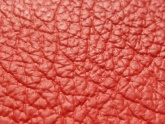
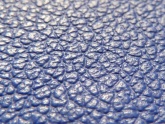
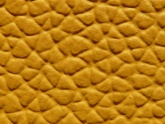
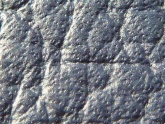
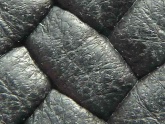
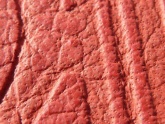

 a kotori web solution
a kotori web solution